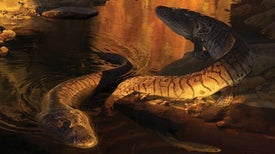
How a 380-Million-Year-Old Fish Gave Us Fingers
A remarkable fossil reveals that the digits in our hands evolved before vertebrates emerged from the water to colonize land

is strategic professor in paleontology at Flinders University in South Australia. His research focuses on the early evolution of vertebrates, including the three-dimensionally preserved Devonian-age fossil fishes found in the Gogo formation in Western Australia. In 2020 he received the prestigious Bettison and James Award for lifelong achievement for his work as both a scientist and an author. Credit: Nick Higgins

A remarkable fossil reveals that the digits in our hands evolved before vertebrates emerged from the water to colonize land

Fish fossils push back the origin of copulation in backboned animals and suggest that it was a key turning point in our evolution
Support science journalism.

Thanks for reading Scientific American. Knowledge awaits.
Already a subscriber? Sign in.
Thanks for reading Scientific American. Create your free account or Sign in to continue.
Create Account